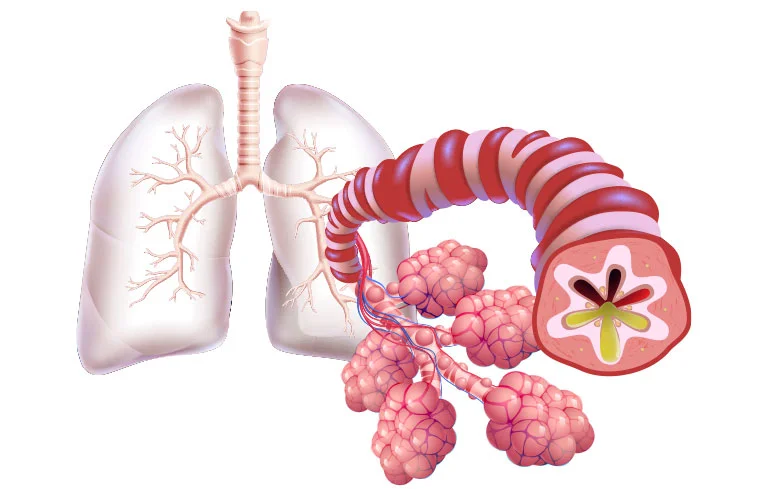- Home
- Departments
Departments Of Bronchitis
BronchitisBronchitis is a respiratory condition characterized by inflammation of the bronchial tubes, the airways that carry air to and from the lungs. It can be acute or chronic and may be caused by viral or bacterial infections, irritants, or underlying health conditions. Bronchitis can lead to symptoms such as coughing, wheezing, chest discomfort, and difficulty breathing.
Key Features of Bronchitis:
Acute Bronchitis: Acute bronchitis is a temporary inflammation of the bronchial tubes, usually caused by viral infections, such as the common cold or influenza. It is characterized by symptoms such as coughing, often with phlegm or mucus production, chest discomfort, mild fever, and fatigue. Acute bronchitis typically resolves on its own within a few weeks, with symptomatic treatment aimed at relieving cough and discomfort.
Chronic Bronchitis: Chronic bronchitis is a type of chronic obstructive pulmonary disease (COPD) characterized by persistent inflammation of the bronchial tubes and excessive mucus production. It is often associated with long-term exposure to cigarette smoke or other irritants, such as air pollution or occupational dusts and chemicals. Chronic bronchitis is defined by a productive cough that persists for at least three months per year for two consecutive years. It can lead to progressive airflow limitation and respiratory symptoms such as coughing, wheezing, shortness of breath, and recurrent respiratory infections.
Causes and Risk Factors: Acute bronchitis is commonly caused by viral infections, including rhinovirus, influenza virus, respiratory syncytial virus (RSV), and adenovirus. Bacterial infections, such as Mycoplasma pneumoniae or Bordetella pertussis, may also cause acute bronchitis, particularly in certain populations (such as children or individuals with compromised immune systems). Chronic bronchitis is often associated with cigarette smoking, but other risk factors may include exposure to air pollution, occupational hazards (such as dust or chemicals), and recurrent respiratory infections.
Diagnosis and Treatment: Diagnosis of bronchitis is typically based on medical history, physical examination, and evaluation of symptoms. Diagnostic tests such as chest X-ray or sputum culture may be performed to rule out other respiratory conditions or identify the underlying cause of bronchitis. Treatment of bronchitis depends on the type and severity of the condition. Acute bronchitis is usually managed with symptomatic treatment, such as rest, hydration, over-the-counter cough suppressants or expectorants, and pain relievers. Antibiotics are not usually recommended for acute bronchitis unless a bacterial infection is suspected. Chronic bronchitis may require long-term management with bronchodilators, inhaled corticosteroids, oxygen therapy, and pulmonary rehabilitation to relieve symptoms and improve lung function. Smoking cessation is essential for individuals with chronic bronchitis to slow disease progression and reduce the risk of complications.
Overall, bronchitis is a common respiratory condition characterized by inflammation of the bronchial tubes, leading to symptoms such as coughing, wheezing, and difficulty breathing. While acute bronchitis is usually self-limiting and resolves with symptomatic treatment, chronic bronchitis requires ongoing management to control symptoms and prevent complications. Prompt diagnosis and appropriate treatment are essential for improving outcomes and quality of life for individuals with bronchitis.

